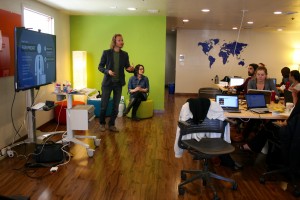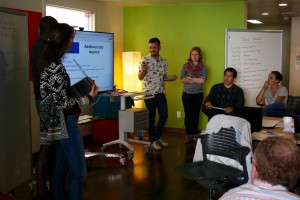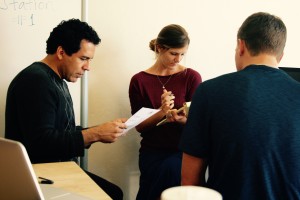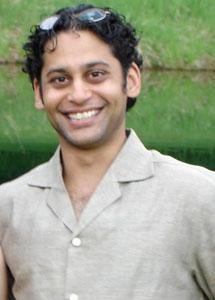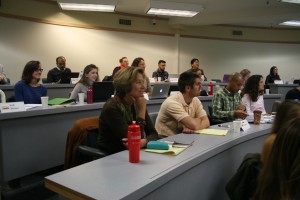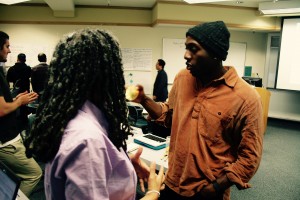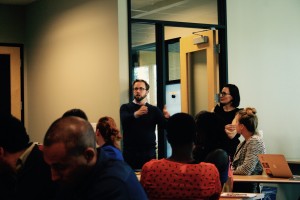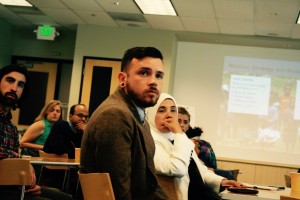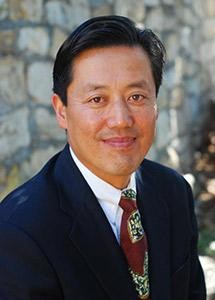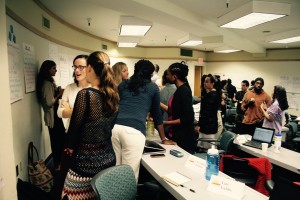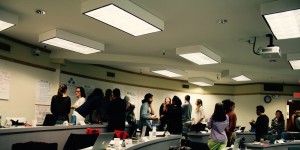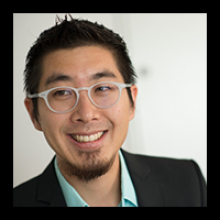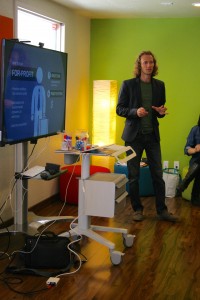 On the last day of the FMS Training program, Andrew Hewitt from GameChangers 500 came to speak on how participants could connect everything they had learned over the past two weeks to launching a career in the impact investment and social enterprise sectors. Participants were led in discussions surrounding what their values are, what really inspires them on a daily basis, and what their core strengths are. Andrew also mapped out the different sectors of for-profit, non-profit, and for-benefit in order to have a deeper discussion on where participants saw themselves heading for their future careers. Participants ended the session with a career commitment toast where they each pledged to do something in the sector as part of their career or life path.
On the last day of the FMS Training program, Andrew Hewitt from GameChangers 500 came to speak on how participants could connect everything they had learned over the past two weeks to launching a career in the impact investment and social enterprise sectors. Participants were led in discussions surrounding what their values are, what really inspires them on a daily basis, and what their core strengths are. Andrew also mapped out the different sectors of for-profit, non-profit, and for-benefit in order to have a deeper discussion on where participants saw themselves heading for their future careers. Participants ended the session with a career commitment toast where they each pledged to do something in the sector as part of their career or life path.
Author: Sarah Sterling
Portfolio Management: Steven Ellis Instructs FMS Participants
 On Thursday, June 11th, Steven Ellis from Colorado Capital Management came to the Middlebury Institute of International Studies to instruct FMS participants on the different aspects of portfolio management. He kicked off the class with a quiz to determine how “risk averse” each participant was with scores ranging from the 70’s – 80’s (“risk loving”) to the 30’s and 40’s (“very risk averse”). Steven broke down the different aspects of what goes into managing million dollar portfolios and got participants to evaluate what their values are when it comes to investing their money. Participants debated between the importance (or not) of companies being involved with issues such as tobacco, oil, alcohol, and even whether gender was taken into account when hiring senior level positions.
On Thursday, June 11th, Steven Ellis from Colorado Capital Management came to the Middlebury Institute of International Studies to instruct FMS participants on the different aspects of portfolio management. He kicked off the class with a quiz to determine how “risk averse” each participant was with scores ranging from the 70’s – 80’s (“risk loving”) to the 30’s and 40’s (“very risk averse”). Steven broke down the different aspects of what goes into managing million dollar portfolios and got participants to evaluate what their values are when it comes to investing their money. Participants debated between the importance (or not) of companies being involved with issues such as tobacco, oil, alcohol, and even whether gender was taken into account when hiring senior level positions.
FMS training: Amit Sharma: Profiling Ventures for Impact Investing
For the second week of FMS training, CSIL welcomed Amit Sharma, founder of Empowerment Capital to talk about how we measure impact when looking at multinational corporations and organizations. Amit challenged participants to think about how we measure impact in the investment space and to come up with other ways in which impact could be measured. Questions were posed to the class such as: Does intent matter when looking at this space? Would you work for a global corporation such as Walmart, Goldman Sachs, and AT&T? Participants worked on analyzing different impact funds of companies from around the globe and critically questioning if those funds were a core part of these companies’ business models.
The Why Factor: Why FMS? Why now?
 By Kamilla Korsnes, FMS Fellow June 2015
By Kamilla Korsnes, FMS Fellow June 2015
During my five years as a business student at NHH in Norway I always felt like something was missing. I found business and economics interesting, but I was looking for some meaning beyond the focus on cost savings and profit maximization. That is how I ended up focusing on business ethics – studying how business can become more sustainable and ethical. However, business ethics has for me so far been mainly academic research. The philosophical and existential approach to business ethics is very interesting, but I would like to learn more about how to solve these problems in real life. I would like to learn more about how business can be used as a tool for solving social and environmental issues, rather than mainly focusing on how existing companies can do less damage. This is a more innovative, positive and future oriented approach. I think business can be a key to solving some of the problems we are facing today, and I strongly believe this is the future of business!
So why FMS? Because I believe I have the skills, knowledge and passion to contribute to a better world. The FMS Program will provide me with new and valuable insight supplementing my business skills and knowledge and help me utilize this knowledge in the best possible way. Why now? I just graduated and I am at the very beginning of my career. I cannot think of a better way to start my career than to do the FMS Training and Fellowship to learn about social entrepreneurship and impact investing.
What kind of social and environmental impact is most meaningful to you?
All kinds of social and environmental impacts are meaningful to me, but closest to my heart is gender equality. I come from one of the most gender equal countries in the world, but even in Norway there are still differences between men and women when it comes to income and career opportunities – and we should continue working towards complete gender equality. Related to this, one of my interests in my business studies has been to understand how to increase the proportion of women in business manager and board positions. I am grateful for growing up in a country where gender equality is taken for granted and something most people don’t fight for anymore. On the other hand I see an issue with taking things for granted – gender equality is something we should fight to maintain and something we should work to accomplish around the world. Empowering women is a key to economic growth and development and I think it will create synergies that can solve other social problems as well. This underlines the importance of giving women the same opportunities and rights when it comes to education, employment, financial inclusion and influence in society.
CSIL and FMS Welcome Alex Lazarow from the Omidyar Network
On Saturday, June 6th the Frontier Market Scouts program welcomed speaker Alex Lazarow from the Omidyar Network to speak on Managing Growth-Stage Enterprises. Participants discussed scaling business in terms of getting from a seed to stage to a scaled enterprise. What are the avenues that start-ups can take in order to get funding from investors?
Then on Monday, participants were able to go up to Redwood City to visit Omidyar’s office to meet staff and hear about their insider perspectives about the work that they are doing in the impact investment space. Participants were also given time to pitch a “Big Idea” for a social enterprise to solve a global or national issue. Pitches included everything from creating solutions to health problems in China to supporting social enterprise in Egypt and even using social enterprise and native food production in order to change communities in developing countries.
Days 4 and 5 of FMS: Due Diligence Process in Impact Investment
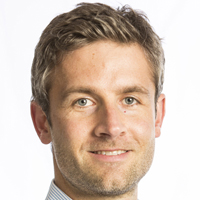 For the fourth and fifth day of the Summer 2015 Frontier Market Scouts training program, participants met instructor Paul Breloff from Accion Venture Labs who came to speak about the due diligence process in investment in social enterprise ventures. Participants were challenged to question impact metrics as well as dive into what the process is for investors looking to get into the impact investment space. Discussion ranged from taking into account environmental impact metrics when doing a business deal to what the difference between a “good deal” and a “good business” – what are investors really looking for? What’s the risk? What’s the return? What is the valuation zone? – these among other topics were discussion points throughout the two sessions. FMS participants also got to hear from guest speakers from the Director of CSIL, Jerry Hildebrand and the Cordes foundation, Ron Cordes.
For the fourth and fifth day of the Summer 2015 Frontier Market Scouts training program, participants met instructor Paul Breloff from Accion Venture Labs who came to speak about the due diligence process in investment in social enterprise ventures. Participants were challenged to question impact metrics as well as dive into what the process is for investors looking to get into the impact investment space. Discussion ranged from taking into account environmental impact metrics when doing a business deal to what the difference between a “good deal” and a “good business” – what are investors really looking for? What’s the risk? What’s the return? What is the valuation zone? – these among other topics were discussion points throughout the two sessions. FMS participants also got to hear from guest speakers from the Director of CSIL, Jerry Hildebrand and the Cordes foundation, Ron Cordes.
FMS Days 2 and 3: Business Modeling for Frontier Market Scouts
For the second and third day of the Frontier Market Scouts training program, participants were led by instructor Yuwei Shi through different business model diagrams and approaches to business model design. Yuwei also introduced guest speaker Keely Stevenson who serves on the advisory board of CSIL at the Middlebury Institute of International Studies at Monterey. Keely was invited to the FMS training to provide a live case study in the form of Weal Life, an online app that connects people in need of care with a support network of family, friends, and community members. FMS participants have been challenged to redesign and pitch a business model for Weal Life on which they will be judged on the third day of the FMS training. In the next 27 hours, FMS participants will go through an ideation stage, form teams, and compete to design the best thought out and presented business model for their version of Weal Life.
June 2015 Frontier Market Scouts Program Begins!
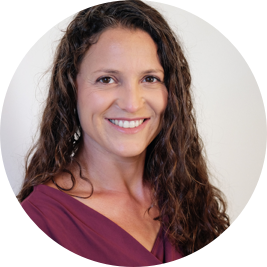 June 1st, 2015 marked the beginning of the Summer FMS program. 27 participants traveled from around the globe from as far as South Africa and India to Monterey in order to learn more about impact investing and social enterprise. The FMS Summer program was kicked off by Morgan Simon from Transform Finance who taught the introductory class on impact investment and social enterprise. Participants were led through definitions of terminology surrounding impact investment as well as the history and current players of the sector. Morgan challenged participants to be “conscientious consumers” of both sectors.
June 1st, 2015 marked the beginning of the Summer FMS program. 27 participants traveled from around the globe from as far as South Africa and India to Monterey in order to learn more about impact investing and social enterprise. The FMS Summer program was kicked off by Morgan Simon from Transform Finance who taught the introductory class on impact investment and social enterprise. Participants were led through definitions of terminology surrounding impact investment as well as the history and current players of the sector. Morgan challenged participants to be “conscientious consumers” of both sectors.
Participants were led through debate style discussion on topics ranging from the privatization of education to critiquing Microfinance and the TOMS Shoes social enterprise model. Morgan also discussed the importance of how impact is measured – “it really depends on what you see as important when you are looking at ways in which to measure impact – are you looking at the status quo? local level or international level?” Participants were left with questions from Morgan to consider for the rest of the training program maybe most important of which: “Who was asked? Who decided? and Who suffers if you fail?”
Commercializing Impact Investment Colloquium Presents: Jenny Kassan from Cutting Edge Capital
On Thursday, May 7th, CSIL and MIIS welcomed guest speaker Jenny Kassan from Cutting Edge Counsel to come and speak as part of the spring 2015 Colloquium on Commercializing Impact Investment. Jenny spoke about her experience as a legal advisor for social entrepreneurs trying to get start up funding for their businesses in the United States. The central message of her talk was: “How can we keep our money local by investing it locally?” – For those that don’t know anything about the legal side of impact investing especially from the lens of a start up social enterprise trying to raise funds for their business, it can be a tricky space to navigate, as Jenny illuminated throughout her presentation.
 For social entrepreneurs that want to get their businesses or nonprofits off the ground, they have to keep in mind not only federal laws that govern fundraising in the U.S. but also individual state laws, all of which have different regulations regarding how you can advertise for a fundraising event up to how much you can actually raise from one event. Jenny walked the colloquium participants through a “Securities Law 101 for the U.S.” talking about what constitutes a security when you are trying to get funds for your business or nonprofit and then dove into DPO’s, or Direct Public Offerings. A DPO “is a term that refers to a public offering of securities by a business or nonprofit to both accredited and non-accredited investors in one or more states. Using a DPO (also known as investment crowdfunding), a business or nonprofit can market and advertise its offering publicly by any means it chooses — through advertising in newspapers and magazines; at public events and private meetings; and on the internet and through social media channels.” Overall, Jenny brought her unique perspective to the colloquium by giving participants a new lens through which they could look into the sector of impact investing and social entrepreneurship.
For social entrepreneurs that want to get their businesses or nonprofits off the ground, they have to keep in mind not only federal laws that govern fundraising in the U.S. but also individual state laws, all of which have different regulations regarding how you can advertise for a fundraising event up to how much you can actually raise from one event. Jenny walked the colloquium participants through a “Securities Law 101 for the U.S.” talking about what constitutes a security when you are trying to get funds for your business or nonprofit and then dove into DPO’s, or Direct Public Offerings. A DPO “is a term that refers to a public offering of securities by a business or nonprofit to both accredited and non-accredited investors in one or more states. Using a DPO (also known as investment crowdfunding), a business or nonprofit can market and advertise its offering publicly by any means it chooses — through advertising in newspapers and magazines; at public events and private meetings; and on the internet and through social media channels.” Overall, Jenny brought her unique perspective to the colloquium by giving participants a new lens through which they could look into the sector of impact investing and social entrepreneurship.
For more information on Cutting Edge Counsel go to: http://cuttingedgecounsel.com
2015 Colloquium on Commercializing Impact Investment Presents: Mike Lin from Fenix International
On Thursday, April 30th, MIIS and CSIL welcomed Mike Lin, founder of Fenix International to speak as part of the 2015 speaker series on Commercializing Impact Investment. Mike was invited to MIIS to give the social entrepreneur’s perspective on the social enterprise and impact investment sector. Mike started off his presentation giving us some background history on the evolution of his solar energy company, Fenix International. Fenix International started with a unique partnership between nonprofit and private entities with cell phone companies and Fenix International both working together to solve a major problem: How can we provide access to electricity to the millions of people living in rural areas?
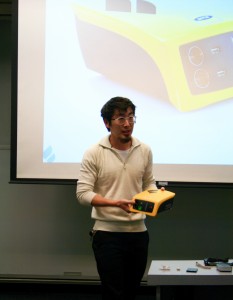
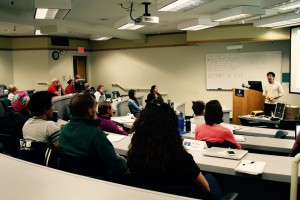
Mike and his dedicated team at Fenix International have been working through multiple iterations to develop the best possible model to provide access not only to light but also to energy itself by designing a portable, solar battery charger which is multi-purpose and comes with many different attachments so that people are able to plug in multiple devices to power and charge them. Fenix International operates off of a “pay-as-you-go” model where their product is linked to a mobile device payment system so that people don’t have to pay for the device outright and can pay for the wattage that they use on a day to day or month to month basis. Mike also talked about how his product is helping to change gender dynamics in the household with Fenix seeing “women as the purveyors of power.” With Fenix’s impact data, they are able to track who is purchasing as well as who is using their product. While men are the primary buyers of the product, women have been seen as the primary users within the household, using the battery and solar panels to charge and power lights, cell phones, computers, and much more. But, Mike argues, there is much more work to be done not only in the development of the energy sector for the BOP populations but also in social enterprise and impact investment in general: “these problems aren’t easy to solve…if they were, someone would have solved them already.” What is really needed to solve these problems as well as to launch a social enterprise of one’s own, Mike argues, is a team where everyone can work together, has complimentary skill sets, as well as passion for what you are doing on a daily basis.

